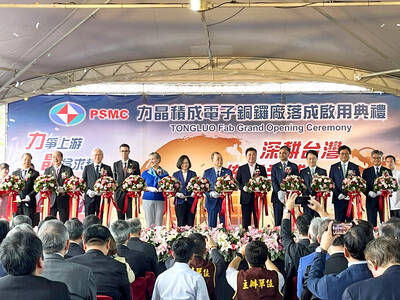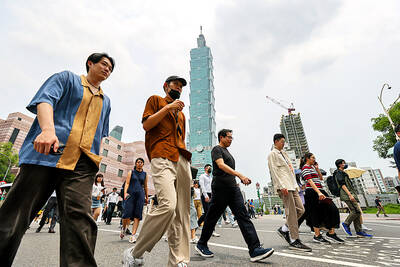Lite-On Technology Corp (光寶科技) yesterday said its board had approved maintaining the company’s high dividend amid concerns about US-China trade tensions.
The company is proposing distributing a cash dividend of NT$2.92 per common share, a payout ratio of up to 85 percent.
Lite-On shares yesterday rose 1.72 percent in Taipei trading, with the payout translating to a 6.3 percent yield based on the NT$47.2 closing price, with the company saying that its free cash flow stood at NT$33.2 billion (US$1.08 billion) at the end of last year.
While lingering trade tensions would likely lead to a quarter-on-quarter sales decline this quarter, the company expects to post “significant” sales gains at the end of this month, Lite-On chief executive Warren Chen (陳廣中) told an earnings conference in Taipei.
In the final quarter of last year, net income fell 4 percent quarter-on-quarter, but rose 10 percent year-on-year to NT$25.21 billion, while revenue dipped 5 percent quarter-on-quarter to NT$50.5 billion, 7 percent lower that the previous year.
Earnings per share were NT$1.08.
During the period, ongoing trade tensions led to imports and consumption falling in China, leading to fewer orders from the company’s Chinese customers, Chen said.
Consumer electronics and home appliances suffered the greatest impact, while softer demand for gaming console power supply units and optical drives had resulted in a less than optimal product mix, Chen added.
However, Lite-On does not have much exposure to the slump in global smartphone sales, he said.
Gross margin in the fourth quarter also fell to 13.4 percent from 15.8 percent the previous quarter, Chen said, attributing the decline to a high comparision base set during the third quarter of last year, while a fall in price of memory chips did not help the company’s average selling price.
While a renegotiation with customers during the height of the US-China trade dispute between July and September had led to higher profitability, price erosion had returned to depress earnings in the fourth quarter, Chen said, adding that the automotive lighting business is facing stiff competition from its Chinese rivals.
Lite-On has plans in place for for production diversification like many of its peers, but the pace would remain slow as the trade talks unfold, he said.
Passive component prices have begun normalizing from scarcity-induced price increases over the past year, but higher inventory levels to fill rush orders ahead of the Lunar New Year holiday would likely add to costs this quarter, he added.
“We have to be ready to fill orders as market conditions rebound,” Chen said.
The company’s net income surged 203 percent year-on-year to NT$7.96 billion last year, with revenue dipping 3.47 percent year-on-year to NT$207.11 billion.

ARTIFICIAL INTELLIGENCE: The chipmaker last month raised its capital spending by 28 percent for this year to NT$32 billion from a previous estimate of NT$25 billion Contract chipmaker Powerchip Semiconductor Manufacturing Corp (力積電子) yesterday launched a new 12-inch fab, tapping into advanced chip-on-wafer-on-substrate (CoWoS) packaging technology to support rising demand for artificial intelligence (AI) devices. Powerchip is to offer interposers, one of three parts in CoWoS packaging technology, with shipments scheduled for the second half of this year, Powerchip chairman Frank Huang (黃崇仁) told reporters on the sidelines of a fab inauguration ceremony in the Tongluo Science Park (銅鑼科學園區) in Miaoli County yesterday. “We are working with customers to supply CoWoS-related business, utilizing part of this new fab’s capacity,” Huang said, adding that Powerchip intended to bridge

Microsoft Corp yesterday said that it would create Thailand’s first data center region to boost cloud and artificial intelligence (AI) infrastructure, promising AI training to more than 100,000 people to develop tech. Bangkok is a key economic player in Southeast Asia, but it has lagged behind Indonesia and Singapore when it comes to the tech industry. Thailand has an “incredible opportunity to build a digital-first, AI-powered future,” Microsoft chairman and chief executive officer Satya Nadella said at an event in Bangkok. Data center regions are physical locations that store computing infrastructure, allowing secure and reliable access to cloud platforms. The global embrace of AI

RIDING AI WAVE: : Most of its NT$15bn capital budget would be spent on packaging technologies used in AI and HPC chips and advanced testing technology, it said Chip testing and packaging service provider Powertech Technology Inc (PTI, 力成科技) plans to increase this year’s capital expenditure by 50 percent to expand capacity to meet growing demand for advanced memorychips used in artificial intelligence (AI) products. The company proposed to spend NT$15 billion (US$460.94 million) to expand advanced capacity and equipment, compared with a budget of NT$10 billion it planned three months ago. “We are seeing a recovery in market demand as well as new business opportunities. We will spend heavily on advanced packaging” equipment, Powertech chief executive officer Boris Hsieh (謝永達) told investors on Tuesday. “We will focus on ramping

INFLATION WATCH: A rate hike in March would help keep inflation at 2.16 percent this year, although a weak currency and higher electricity rates are an issue, S&P said Moody’s Ratings and S&P Global Ratings have reaffirmed Taiwan’s sovereign credit ratings at “As3” and “AA+” respectively with a stable outlook on the back of high income and wealth levels, a strong institutional framework and robust external positions. The affirmations came as Taiwan’s economy is gaining momentum after quarters of slowdown induced by stubborn global inflation and monetary tightening. Taiwan’s strong fiscal and external buffers have improved relative to peers as evidenced by recent shocks linked to the COVID-19 pandemic and the ongoing US-China technology dispute, the two ratings firms said. “Taiwan stands as the epicenter of the global semiconductor supply chain, accounting